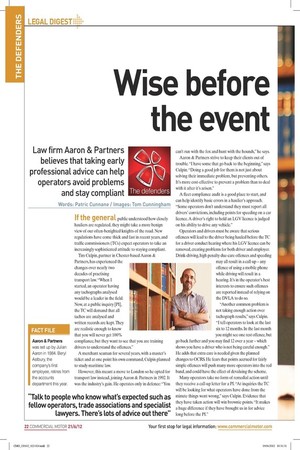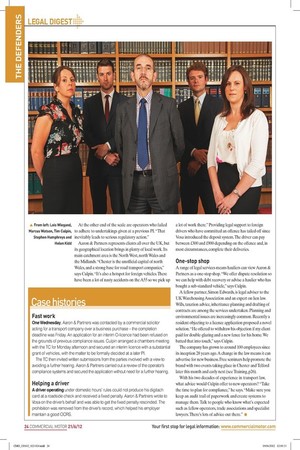Wise before the event
Page 15

Page 17

If you've noticed an error in this article please click here to report it so we can fix it.
Law firm Aaron & Partners believes that taking early professional advice can help operators avoid problems and stay compliant
Words: Patric Cunnane / Images: Tom Cunningham If the general public understood how closely hauliers are regulated, they might take a more benign view of our often-benighted knights of the road. New regulations have come thick and fast in recent years, and traffic commissioners (TCs) expect operators to take an increasingly sophisticated attitude to staying compliant.
Tim Culpin, partner in Chester-based Aaron & Partners, has experienced the changes over nearly two decades of practising transport law. “When I started, an operator having any tachographs analysed would be a leader in the field. Now, at a public inquiry [PI], the TC will demand that all tachos are analysed and written records are kept. They are realistic enough to know that you will never get 100% compliance, but they want to see that you are training drivers to understand the offences.” A merchant seaman for several years, with a master’s ticket and at one point his own command, Culpin planned to study maritime law.
However, this meant a move to London so he opted for transport law instead, joining Aaron & Partners in 1992. It was the industry’s gain. He operates only in defence: “You can’t run with the fox and hunt with the hounds,” he says.
Aaron & Partners strive to keep their clients out of trouble. “I have some that go back to the beginning,” says Culpin. “Doing a good job for them is not just about solving their immediate problem, but preventing others. It’s more cost-effective to prevent a problem than to deal with it after it’s arisen.” A fleet compliance audit is a good place to start, and can help identify basic errors in a haulier’s approach. “Some operators don’t understand they must report all drivers’ convictions, including points for speeding on a car licence. A driver’s right to hold an LGV licence is judged on his ability to drive any vehicle.” Operators and drivers must be aware that serious offences will lead to the driver being hauled before the TC for a driver conduct hearing where his LGV licence can be removed, creating problems for both driver and employer. Drink-driving, high penalty due-care offences and speeding may all result in a call-up – any offence of using a mobile phone while driving will result in a hearing. It’s in the operator’s best interests to ensure such offences are reported instead of relying on the DVLA to do so.
“Another common problem is not taking enough action over tachograph results,” says Culpin. “I tell operators to look at the last six to 12 months. In the last month you might see one rest offence, but go back further and you may find 12 over a year – which shows you have a driver who is not being careful enough.” He adds that extra care is needed given the planned changes to OCRS. He fears that points accrued for fairly simple offences will push many more operators into the red band, and could have the effect of devaluing the scheme.
Many operators take no form of remedial action until they receive a call-up letter for a PI. “At inquiries the TC will be looking for what operators have done from the minute things went wrong,” says Culpin. Evidence that they have taken action will win brownie points. “It makes a huge difference if they have brought us in for advice long before the PI.” At the other end of the scale are operators who failed to adhere to undertakings given at a previous PI. “That inevitably leads to serious regulatory action.” Aaron & Partners represents clients all over the UK, but its geographical location brings in plenty of local work. Its main catchment area is the North West, north Wales and the Midlands. “Chester is the unofficial capital of north Wales, and a strong base for road transport companies,” says Culpin. “It’s also a hotspot for foreign vehicles. There have been a lot of nasty accidents on the A55 so we pick up a lot of work there.” Providing legal support to foreign drivers who have committed an offence has tailed off since Vosa introduced the deposit system. The driver can pay between £300 and £900 depending on the offence and, in most circumstances, complete their deliveries.
One-stop shop
A range of legal services means hauliers can view Aaron & Partners as a one-stop shop. “We offer dispute resolution so we can help with debt recovery or advise a haulier who has bought a sub-standard vehicle,” says Culpin.
A fellow partner, Simon Edwards, is legal adviser to the UK Warehousing Association and an expert on lien law. Wills, taxation advice, inheritance planning and drafting of contracts are among the services undertaken. Planning and environmental issues are increasingly common. Recently a resident objecting to a licence application proposed a novel solution. “He offered to withdraw his objection if my client paid for double-glazing and a new fence for his home. We batted that into touch,” says Culpin.
The company has grown to around 100 employees since its inception 28 years ago. A change in the law means it can advertise for new business. Free seminars help promote the brand with two events taking place in Chester and Telford later this month and early next (see Training, p26).
With his two decades of experience in transport law, what advice would Culpin offer to new operators? “Take the time to plan for compliance,” he says. “Make sure you keep an audit trail of paperwork and create systems to manage them. Talk to people who know what’s expected such as fellow operators, trade associations and specialist lawyers. There’s lots of advice out there.” n











































